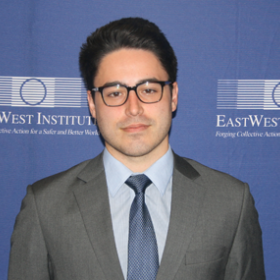
Preventing Nuclear Terrorism
The EastWest Institute hosted “Preventing Nuclear Terrorism: Recommendations Based on a U.S.-Russian Joint Threat Assessment,” a launch event for the release of a jointly produced report by Harvard’s Belfer Center for Science and International Affairs and the Russian Academy of Sciences’ Institute for U.S. and Canada Studies. The event took place on October 2 at EWI’s New York Center.
Moderated by EWI’s Andrew Nagorski, the event, which was attended by experts and diplomats, featured a conversation with William Tobey of the Belfer Center and Pavel Zolotarev of the Institute for U.S. and Canada Studies. They introduced the report and outlined specific policy recommendations for the U.S. and Russia aimed at reducing the threat of nuclear terrorism. Building upon a previous study released in 2011, this new report identifies the legal and political frameworks for cooperation, current gaps and weaknesses, and proposals to improve U.S. and Russian efforts to prevent and respond to nuclear terrorism.
“The threat of nuclear terrorism is both urgent and real,” Tobey declared, citing a number of cases over the past decade where fissile material was seized outside of regulatory control. These incidents warrant deep concern not only because they highlight the inadequacy of current security measures, but also because the interdicted materials represented only a sample of much larger quantities for sale.
As it stands today, Tobey noted, “The U.S. and Russian governments are not well organized to cooperate in suppressing illegal trafficking of nuclear materials to combat nuclear terrorism.”
One of the obstacles that continue to frustrate U.S. and Russian efforts to prevent and manage the threat of nuclear terrorism are the divergent responses the two countries apply to nuclear crises. Though both parties acknowledge that the acquisition of fissile materials by terrorists pose a grave threat, the U.S. and Russia differ in policy responses, eschew information sharing, and have very different public notification strategies.
Zolotarev added that the amount of attention paid to the cooperation procedures between the U.S. and Russia are inadequate or nonexistent. “We cannot remain complacent when considering preventing nuclear terrorism,” he warned.
In order to more effectively combat the threat of nuclear terrorism, the report’s authors recommend three sets of actions for U.S. and Russian authorities. The U.S. and Russia should pursue joint actions in working groups composed of high-ranking officials; introduce parallel measures including improvements in nuclear security practices and regulatory enforcement; and take the lead in pursuing cooperative activities in concert with other countries.
As possessors of the world’s largest nuclear inventories, the U.S. and Russia share a special responsibility for leading international efforts to reduce the threat posed by nuclear terrorism, the speakers pointed out. Although the U.S. and Russia often find themselves at odds on a host of other issues, nuclear security is a critical area in which U.S. and Russian national interests coincide, particularly when it comes to the threat of terrorism. The recommendations put forth in this report and expounded upon by Tobey and Zolotarev are meant to serve as a catalyst for more vigorous actions by both countries, acting in concert, which should benefit everyone.

